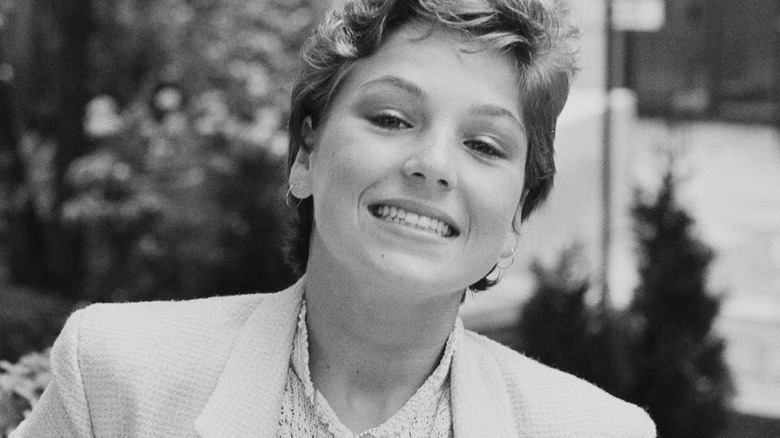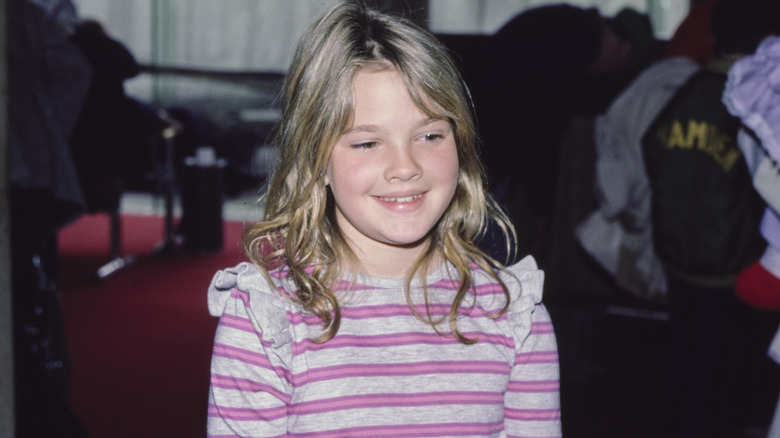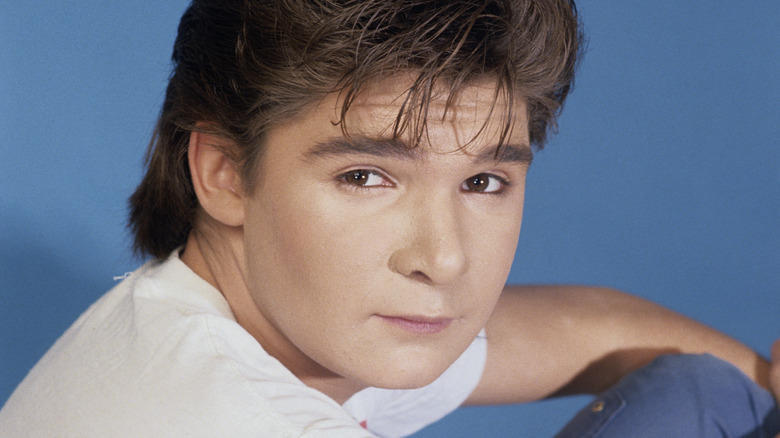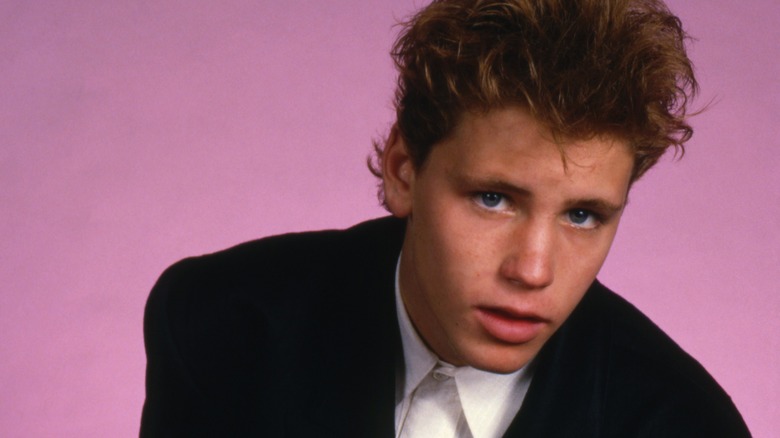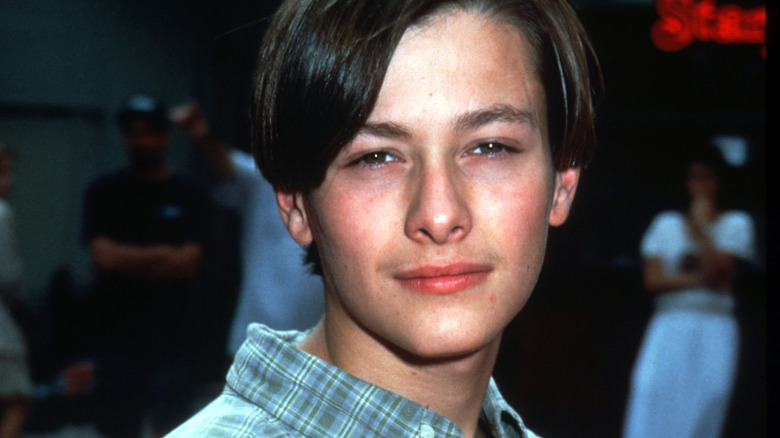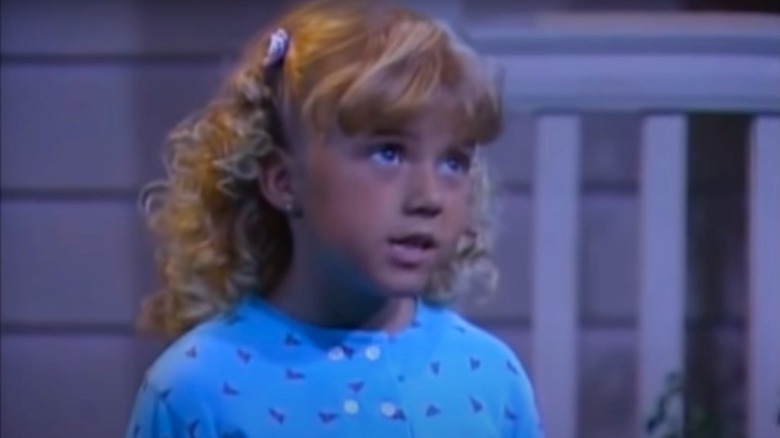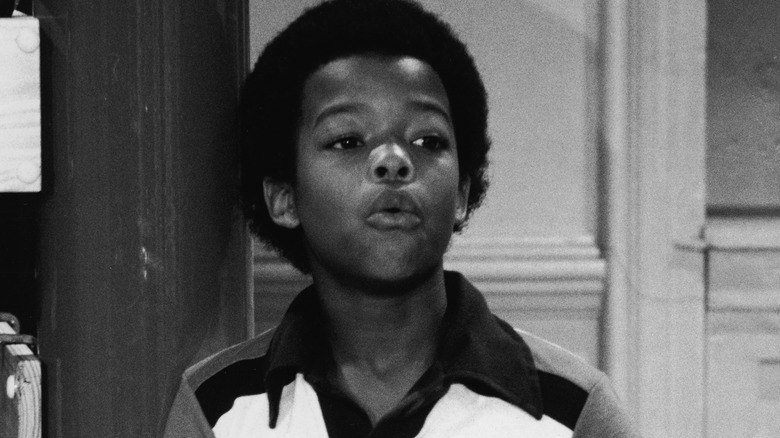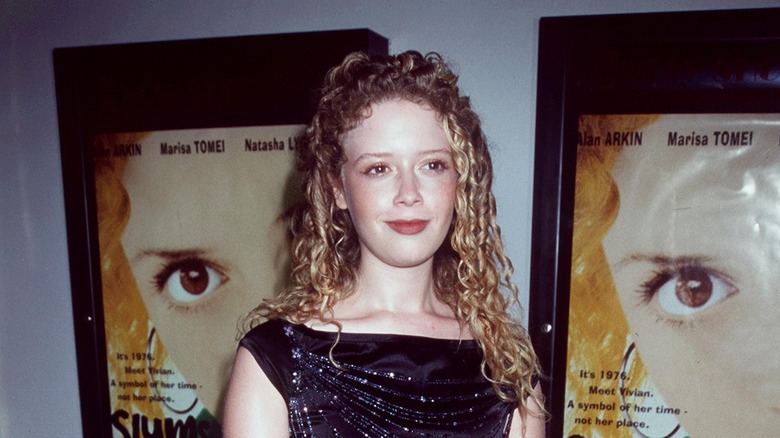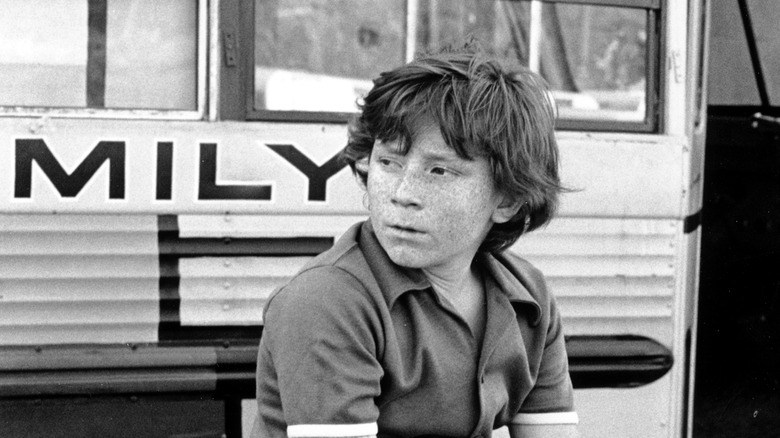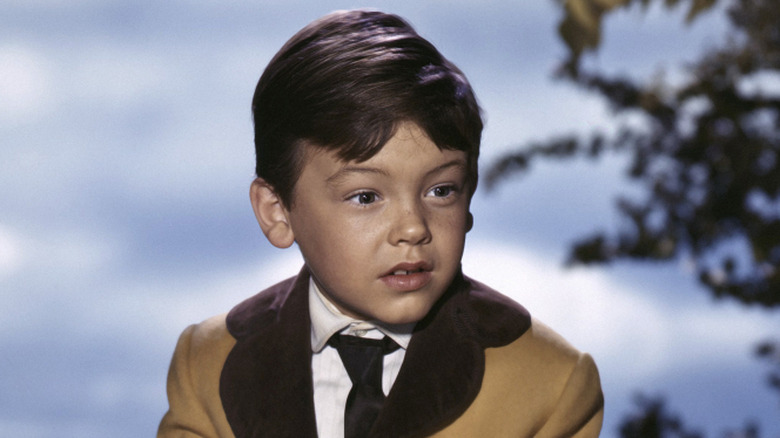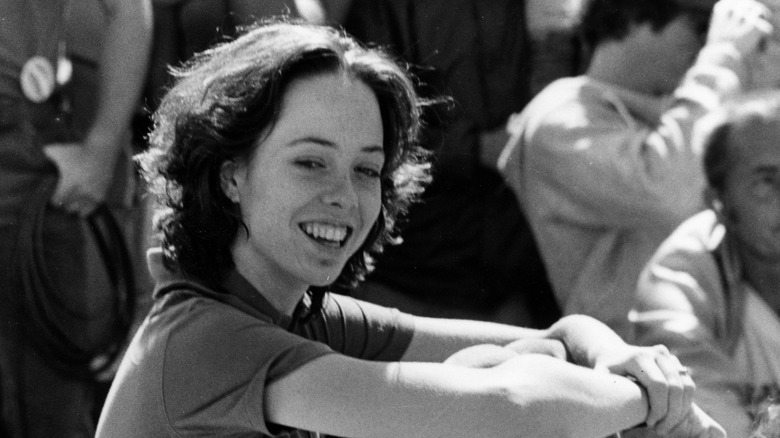Celebs Who Got Addicted To Drugs As Child Actors
This article contains triggers for risky substance use, addiction, and mental health.
Child actors have been a staple in Hollywood since the earliest days of cinema. From the Little Rascals of "Our Gang" fame to Jackie Coogan — who famously starred alongside Charlie Chaplin in "The Kid" — cute kids have long proven to be a reliable way for Hollywood studios to attract viewers. Shirley Temple, for example, was Hollywood's most lucrative box-office draw by 1935, when she was all of six years old.
Of course, the career of a child actor is typically a short one, often ending around the onset of puberty. And while there have been many who have successfully transitioned from child actor to adult roles — Elizabeth Taylor, Kurt Russell and the "Harry Potter" kids, for example — there are far more whose Hollywood careers peaked before hitting adolescence. Meanwhile, there are also many child actors who fell victim to the dark side of Tinseltown, sampling drugs and alcohol at a young age and eventually finding themselves caught up in a web of addiction. "I was a child actor, and if you survive it teaches you a lot," admitted Ethan Hawke to Entertainment Weekly. "The trouble is that most people don't survive. I'm not speaking figuratively. I'm talking literally, like there's dead bodies everywhere."
Sadly, Hawke isn't wrong; young stars who wind up spiraling into drug addiction has become an all-too-common scenario in Hollywood. To find out more, keep reading for a look at some celebs who got addicted to drugs as child actors.
If you or anyone you know needs help with addiction issues, help is available. Visit the Substance Abuse and Mental Health Services Administration website or contact SAMHSA's National Helpline at 1-800-662-HELP (4357).
Tatum O'Neal was born into the Hollywood fast lane
Tatum O'Neal was born in 1963, daughter of actors Ryan O'Neal and Joanna Moore. As her father's stardom grew in the late 1960s and early 1970s, she had a front-row seat for the adult excesses that characterized Hollywood during that era. When she was just nine, she made her movie debut, co-starring opposite her dad in the 1973 drama "Paper Moon" and winning an Oscar for her performance. That auspicious debut led the floodgates to open, with starring roles in such films as "The Bad News Bears," "Nickelodeon," and "Little Darlings."
Yet all that glitz and glamor hid the reality of chaos and abuse. Her parents divorced when she was just four, and her mother became addicted to drugs. She and her brother, O'Neal told ABC News, grew up with no guidance. "I was getting in trouble," she explained. "I wasn't going to school. My teeth were rotting. Like, that was really happening, you know, and I was suffering." When she was 15, she explained to ABC News, her father recommended cocaine as a way to curb her adolescent weight gain. By the time she was 20, she had become a full-fledged addict.
O'Neal spent the next two decades battling addiction, going in and out of rehab until a 2008 arrest while attempting to buy crack from a street dealer finally pushed her to get sober for good.
If you or anyone you know needs help with addiction issues, help is available. Visit the Substance Abuse and Mental Health Services Administration website or contact SAMHSA's National Helpline at 1-800-662-HELP (4357).
Drew Barrymore entered rehab at 13
Drew Barrymore can proudly wear the mantle of Hollywood royalty, given that her grandfather was screen icon John Barrymore, whose siblings Ethel and Lionel Barrymore were also Hollywood stars. Drew booked her first acting gig — a dog food commercial — before her first birthday, and skyrocketed to fame in Steven Spielberg's "E.T. the Extra-Terrestrial" at age seven. Further roles came, ranging from "Firestarter" to "Babes in Toyland," as did an early introduction to alcohol; as she told People in 1989, she began drinking at nine, smoking weed at 10 and snorting cocaine at 12. By 13, she'd been through rehab twice.
By 14, Barrymore was legally emancipated and back in rehab, where she met rock legend David Crosby and wife Jan Dance, themselves recovering addicts. Discovering that Barrymore's insurance would soon run out and she'd be sent home, Crosby recognized the teenager wasn't ready to leave, and staying with her parents — both of whom had their own issues with substance abuse — was a recipe for disaster. "She came and stayed with us for awhile," Crosby said during a 2022 appearance on "The Howard Stern Show." "We took her to school in the morning and tried to be a good influence."
Barrymore got clean after that, although she continued drinking in moderation until eventually quitting altogether. "It was something that I realized just did not serve me and my life," she told "CBS Mornings" of her decision to banish alcohol from her life.
If you or anyone you know needs help with addiction issues, help is available. Visit the Substance Abuse and Mental Health Services Administration website or contact SAMHSA's National Helpline at 1-800-662-HELP (4357).
Corey Feldman was exposed to drugs at an early age
Corey Feldman was just three when he shot his first commercial, and seven when he made his television debut in a 1978 episode of TV drama "Eight is Enough." He'd racked up dozens of TV guest spots when he was cast in 1984 comedy-horror hit "Gremlins," leading to high-profile roles in feature films including "Goonies," "Stand By Me," and "The Lost Boys." Looking back at his childhood in an interview with the AV Club, Feldman equated being a child actor with "child slavery." As Feldman wrote in his autobiography "Coreyography," he was a teenager when his father hired him an adult assistant — "Ron" — who introduced him to drugs while also abusing him.
It was after Feldman became legally emancipated at age 15 that he began delving deeper into drugs, becoming addicted to cocaine and, eventually, heroin. He had been arrested three times for various drug offenses when he entered rehab in December 1990. Feldman was just 19.
Feldman's acting career never recaptured the heights of his work as a child actor, but he eventually managed to put drug abuse behind him. "I feel very grateful and very lucky to be alive still, to have any kind of semblance of normal life ... I don't take any of it for granted," he told the Associated Press back in 2016.
If you or anyone you know needs help with addiction issues, help is available. Visit the Substance Abuse and Mental Health Services Administration website or contact SAMHSA's National Helpline at 1-800-662-HELP (4357).
If you or someone you know may be the victim of child abuse, please contact the Childhelp National Child Abuse Hotline at 1-800-4-A-Child (1-800-422-4453) or contact their live chat services.
Corey Haim's troubled life ended far too soon
Corey Feldman was close with fellow child actor Corey Haim; not only were they best friends — known collectively as "the two Coreys" — they appeared in several movies together, including "The Lost Boys" and "Licence to Drive." Like Feldman, Haim was offered liquor and drugs by adults who molested him. He smoked his first joint, he told The Sun (via Los Angeles Times), while filming "The Lost Boys," which soon led to harder stuff. "I lived in L.A. in the 1980s, which was not the best place to be," he said. "I did cocaine for about a year and a half, then it led to crack."
Haim went to rehab for the first time in 1989, when he was 18. It wouldn't be the last; Haim reportedly went to rehab more than 15 times. After one of those stints, he was prescribed medication that led to a new addiction. "I started on the downers, which were a hell of a lot better than the uppers because I was a nervous wreck," he said. "But one led to two, two led to four, four led to eight, until at the end it was about 85 a day . . . and that was just the Valium. I'm not talking about the other pills I went through."
In 2010, Haim was found dead of what was suspected to be a drug overdose, but was eventually determined to be pneumonia. He was 38.
If you or anyone you know needs help with addiction issues, help is available. Visit the Substance Abuse and Mental Health Services Administration website or contact SAMHSA's National Helpline at 1-800-662-HELP (4357).
Edward Furlong lost his teeth after years of meth use
When Edward Furlong was 13, he was one of thousands of unknowns to audition for the role of young John Conner in "Terminator 2: Judgement Day." "[I was] picked up from nowhere, just auditioned for it and before I knew it, I was doing it," Furlong recalled in an interview with the Daily Mail. Going from zero to stardom at such a young age was a lot to handle; left without adult supervision, booze and marijuana soon entered the picture, followed by cocaine and heroin. "I was never a normal teenager. I had a very un-normal life. I was almost destined for [drug addiction]," he mused, recalling that "when I was high, I had camaraderie with other people."
As he grew into adulthood and acting roles grew fewer, Furlong's drug abuse escalated. In 2012, a judge banned him from spending time alone with his son when the child, then six, tested positive for cocaine. According to People, in January 2013, he was arrested on charges of domestic violence; a few months later, he was arrested again for violating a protective order that his that his ex-wife had obtained in 2010. He was subsequently sentenced to six months in jail for violating that protective order (via USA Today).
Furlong told Daily Mail in 2022 that at that point he'd been sober for four years. One unfortunate side effect of his addiction, he revealed, was that many of his teeth had rotted due to prolonged meth use.
If you or anyone you know needs help with addiction issues, help is available. Visit the Substance Abuse and Mental Health Services Administration website or contact SAMHSA's National Helpline at 1-800-662-HELP (4357).
If you or someone you know is dealing with domestic abuse, you can call the National Domestic Violence Hotline at 1−800−799−7233. You can also find more information, resources, and support at their website.
Jodie Sweetin turned to drugs after Full House ended
Jodie Sweetin's career as a child actor peaked with "Full House," in which she played Stephanie Tanner throughout the sitcom's 1987-1995 run. She was just 13 when "Full House" ended; as Sweetin revealed while competing on "Dancing With the Stars" (via ET), that was when everything changed. "It was a huge shift in my life. Everything I had known from the time I was five years old suddenly ended and it was like saying goodbye to a family I had loved very, very much," Sweetin explained.
"Drugs and alcohol just sort of numbed everything. I was doing cocaine and ecstasy and alcohol and all of that," she said of how she coped. By the time she was 20, she told NBC's "Today," she was a bull-blown addict. "At the time I started doing the hard drugs, the methamphetamine and coke and stuff, it was a lot easier to hide than drinking," she explained.
In 2007, Sweetin had apparently turned her life around, and spoke to students at Marquette University to discuss her newfound sobriety. Except, as she subsequently divulged in her 2009 memoir "UnSweetined," she was actually on the tail end of a cocaine bender when she took to the podium. Sweetin continued to struggle with addiction until getting sober in 2015. "My life is amazing," Sweetin told People in 2020. "I will have five years [of sobriety] in March. It's given me a lot of gratitude."
If you or anyone you know needs help with addiction issues, help is available. Visit the Substance Abuse and Mental Health Services Administration website or contact SAMHSA's National Helpline at 1-800-662-HELP (4357).
Todd Bridges' drug addiction led to multiple arrests
Todd Bridges was once a child star on a successful TV sitcom, playing Willis Drummond on "Diff'rent Strokes." When the show was canceled, Bridges felt as if the rug had been yanked out from under him at age 21. Bridges, who began smoking marijuana at 15 while on "Diff'rent Strokes," wound up getting deep into cocaine and meth, and eventually began dealing drugs in order to fund his addiction. Troubles with the law came soon after, when he was arrested in 1987 for making a bomb threat; he pleaded no contest and received three years' probation.
Bridges was then arrested in 1990 on drug charges — which was complicated by the fact that he was awaiting trial for charges stemming from a previous arrest, involving a drug-related shooting, per the Los Angeles Times. Bridges was ultimately acquitted on the shooting charges, thanks to the shrewd legal work of attorney Johnnie Cochran (via Los Angeles Times). In 1992, according to yet another article by the Los Angeles Times, Bridges was arrested again, when guns and drugs were discovered in his car. This time, however, Bridges was given a choice between jail and rehab: he chose the latter, and was sentenced to undergo a year-long rehabilitation program.
The program resonated with Bridges; February 24, 1993 is a day that holds special significance for him, as the day when he finally became sober. "I just decided that I could no longer live this way — I didn't like the person I had become," Bridges told CNN.
If you or anyone you know needs help with addiction issues, help is available. Visit the Substance Abuse and Mental Health Services Administration website or contact SAMHSA's National Helpline at 1-800-662-HELP (4357).
Hayden Panettierre hid a serious addiction to opioids
Hayden Panettiere was just nine when she logged her first TV credit; by the time she landed her breakthrough role in the 2004 Disney Channel movie "Tiger Cruise" at 14, Panettiere was already TV and film veteran, with extended stints on soaps "Guiding Light" and "One Life to Live," and film roles in "Remember the Titans" and Pixar's animated "A Bug's Life."
According to Panettiere, at one point her team began giving her "happy pills" before media appearances. "They were to make me peppy during interviews," Panettiere told People. "I had no idea that this was not an appropriate thing, or what door that would open for me when it came to my addiction." Over time, alcohol and opioids were added to the mix, and her dependency grew greater by the day. "And as I got older, the drugs and alcohol became something I almost couldn't live without," she admitted.
Her addictions escalated, and, she believes, were responsible for the end of her tumultuous relationship with Wladimir Klitschko. At her lowest point, she confessed, "I would have the shakes when I woke up and could only function with sipping alcohol." Eventually, she sought treatment, and has been sober ever since. "It's an everyday choice, and I'm checking in with myself all the time," she admitted. "But I'm just so grateful to be part of this world again, and I will never take it for granted again."
If you or anyone you know needs help with addiction issues, help is available. Visit the Substance Abuse and Mental Health Services Administration website or contact SAMHSA's National Helpline at 1-800-662-HELP (4357).
Amanda Bynes admits she 'abused Adderall'
Amanda Bynes was a standout on "All That," Nickelodeon's sketch-comedy series for kids, so much so that she was eventually made star of her own sketch show, "The Amanda Show." Bynes eventually transitioned from Nickelodeon to The WB, starring alongside Jennie Garth in sitcom "What I Like About You," and starring in such movies as "She's the Man," "Sydney White," and "Hairspray."
While Bynes wasn't much of a teen drinker, she developed a fondness for marijuana. "I started smoking marijuana when I was 16. Even though everyone thought I was the 'good girl,' I did smoke marijuana from that point on," she told Paper. "Later on it progressed to doing molly and ecstasy," she added, noting she sampled cocaine but never liked it.
Around the time she was working on "Hairspray," Bynes finagled a prescription for Adderall after being told of the medication's reputation as a "skinny pill" that would deter weight gain. "I definitely abused Adderall," she admitted. "When I was doing 'Hall Pass,' I remember being in the trailer and I used to chew the Adderall tablets because I thought they made me [more] high [that way]," she said. "I remember chewing on a bunch of them and literally being scatterbrained and not being able to focus on my lines or memorize them for that matter." Bynes had reportedly been five years sober when she suffered a relapse and checked herself into rehab in 2019.
If you or anyone you know needs help with addiction issues, help is available. Visit the Substance Abuse and Mental Health Services Administration website or contact SAMHSA's National Helpline at 1-800-662-HELP (4357).
Natasha Lyonne's heroin addiction left her 'as good as dead'
These days, Natasha Lyonne is best known for her work on TV series "Orange is the New Black," "Russian Doll," and "Poker Face." Her earliest role, however, came when she was just six, as one of the kids on "Pee-Wee's Playhouse." From there, Lyonne became a sought-after child actor, appearing in numerous high-profile films. "I had to become coherent and a businesswoman at six. By 10, I was a jaded professional. By 16, my youth was over and my goose cooked," Lyonne recalled in a 2008 interview with Heeb Magazine.
Like many child actors, she was introduced to booze and drugs early on, eventually graduating to heroin. "I thought heroin was hilarious," she deadpanned, admitting, "I was really [expletive] up for a while." During that period she became a tabloid staple; she was even evicted by her landlord, actor Michael Rapaport, who wrote a not-so-glowing report of having a heroin-addicted Lyonne for a tenant.
She eventually wound up in an ICU with Hepatitis C and a collapsed lung; Lyonne estimated her weight had dropped to a startling 75 pounds. "I was definitely as good as dead, you know?" Lyonne told Entertainment Weekly. "A lot of people don't come back." For Lyonne, though, hitting rock bottom proved to be the impetus to get sober. "People really rallied around me and pulled me up by my [expletive] bootstraps," she said, jokingly adding, "There was a warrant for my arrest, which helped too."
If you or anyone you know needs help with addiction issues, help is available. Visit the Substance Abuse and Mental Health Services Administration website or contact SAMHSA's National Helpline at 1-800-662-HELP (4357).
Danny Bonaduce was 'famous and homeless'
Danny Bonaduce was one of TV's hottest kid stars as Danny Partridge on 1970s sitcom "The Partridge Family," cast when he was just 11. After the show's end in 1974, the teenage Bonaduce's life spiraled out of control when his escalating drug use left him "famous and homeless" in Hollywood. "I lived right behind this dumpster but I lived in my car," Bonaduce told "Oprah: Where Are They Now" (via Daily News), noting that he'd pose for photos with tourists who had no idea about his circumstances. "When I knew they wouldn't see me I would sneak back to my car," he said.
He recalled a conversation with his mother that ultimately helped him get on the right track, at least for a while. "She said, 'I think you're going to die very soon. I want to make sure that I knew that I told you that I love you before I get the phone call that you are dead," Bonaduce recalled. Ultimately, though, Bonaduce continued to struggle with alcohol and drugs well into his adulthood. "I was probably legally drunk for about 25 years," admitted Bonaduce, who was arrested twice, in 1990 while trying to buy cocaine, and in 1991 for allegedly robbing and beating a transgender escort.
In 2016, Bonaduce — now a successful radio host and occasional reality TV star — responded to a tweet about how he would fare in a drinking contest, writing, "I've been sober 5 years, bro."
If you or anyone you know needs help with addiction issues, help is available. Visit the Substance Abuse and Mental Health Services Administration website or contact SAMHSA's National Helpline at 1-800-662-HELP (4357).
Disney star Bobby Driscoll became hooked on heroin
Bobby Driscoll's name is a seldom-remembered one these days, but in his heyday in the late 1940s and early '50s he was arguably Hollywood's top child actor thanks to roles in such Disney hits as "Song of the South," "Treasure Island," and voicing the title character in "Peter Pan." When he turned 16, noted Entertainment Weekly, he was dumped by Disney when the studio failed to renew his contract. It was during those years, when his movie career had fizzled but he could still land guest spots on television, that he began using heroin. "It wasn't a secret," recalled friend and fellow child actor Billy Gray (who played Bud Anderson on sitcom "Father Knows Best"). "He liked heroin. That's just the way it was."
Driscoll's life began spiraling downward, which included multiple arrests for drug possession and other infractions, ultimately sentenced to undergo drug rehabilitation in a California prison. "I had everything," Driscoll said in an interview after he was sentenced (via Entertainment Weekly). "Was earning $50,000 a year... working steadily with good parts. Then I started putting all my spare time in my arm. I'm not really sure why I started using narcotics. I was 17 when I first experimented with the stuff. In no time at all, I was using whatever was available... mostly heroin, because I had the money to pay for it." Driscoll died in 1968 from hardening of the arteries, brought about by his heroin use. He was 31.
If you or anyone you know needs help with addiction issues, help is available. Visit the Substance Abuse and Mental Health Services Administration website or contact SAMHSA's National Helpline at 1-800-662-HELP (4357).
Mackenzie Phillips was introduced to cocaine by her rock star dad
Mackenzie Phillips was a teenager when she became a household name in the 1970s through her role in the hit TV sitcom "One Day At a Time," having landed her first acting role at 14 in "American Graffiti." Unlike most child actors, though, Phillips' introduction to drugs didn't come from her fame, but from her famous father, Mamas and the Papas founder John Phillips. As she revealed during an interview for "Oprah: Where Are They Now," her dad taught her to roll joints when she was 10, and introduced her to cocaine when she was 11.
According to People, in November 1977, the 18-year-old Phillips was arrested and charged with disorderly conduct when police found her "semiconscious" on an L.A. street, while a search revealed a straw with traces of cocaine on it. By 1980, Phillips' drug addiction had begun affecting her work. As People reported, producers — alarmed at her skeletal appearance — wrote her off the show temporarily, ordering her to take six weeks and try to gain some weight; her condition only grew worse, and she was fired. Barbara Brogliatti, publicist for the show's producer, Norman Lear, offered a blunt assessment: "She has a drug-related medical problem. She just can't work. I consider this firing a step toward saving a child's life. The kid's in real trouble."
Phillips estimated she spent a half-million dollars on drugs, but ultimately turned her life around. She's now working as a drug rehab counselor.
If you or anyone you know needs help with addiction issues, help is available. Visit the Substance Abuse and Mental Health Services Administration website or contact SAMHSA's National Helpline at 1-800-662-HELP (4357).


